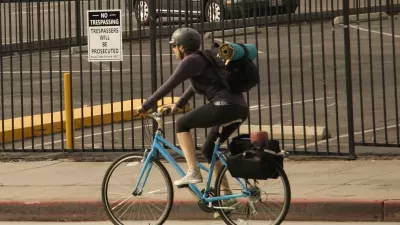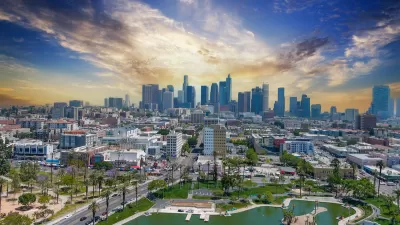In a strange confluence of factors, expired speed limits and a state statute have hampered speed enforcement. Unfortunately, the proposed solution also looks a like a problem.

Laura J. Nelson reports that an increase in speed limits on more than 100 miles of city streets might be coming to Los Angeles. The city is lagging in reaching its Vision Zero goals to eliminate traffic deaths in the city by 2025, and vehicle speed is a factor that can drastically affect a pedestrian’s chance of survival after a collision. But city officials say higher speed limits will ease existing enforcement restrictions, reports Nelson:
The dilemma stems from a decades-old California law designed to protect drivers from speed traps, which requires cities to post speed limits that reflect the natural speed of traffic. If a speed limit is too low, or if it is more than 7 years old, the police can’t use radar guns or other electronic devices to write speeding tickets there.
Speed limits had expired on over 200 miles of Los Angeles streets, as of this past summer, with minimal enforcement in these areas. Two-thirds of the street miles currently up for consideration are in the San Fernando Valley, where the speed limit has crept upward on many streets in the last decade, says Nelson. "Residents have approached the speed limit increases with trepidation, saying they are reluctant to see higher speed limits, but support more speed enforcement that targets the most dangerous drivers."
As for how Los Angeles found itself in this situation, Nelson notes that the Department of Transportation team conducting speed studies lost staff during the Great Recession and needed updates were not conducted. As a result, the number of speeding tickets issued by police plunged 77 percent from 2010 to 2017.
FULL STORY: L.A. considers raising speed limits on more than 100 miles of streets

Alabama: Trump Terminates Settlements for Black Communities Harmed By Raw Sewage
Trump deemed the landmark civil rights agreement “illegal DEI and environmental justice policy.”

Planetizen Federal Action Tracker
A weekly monitor of how Trump’s orders and actions are impacting planners and planning in America.

The 120 Year Old Tiny Home Villages That Sheltered San Francisco’s Earthquake Refugees
More than a century ago, San Francisco mobilized to house thousands of residents displaced by the 1906 earthquake. Could their strategy offer a model for the present?

In Both Crashes and Crime, Public Transportation is Far Safer than Driving
Contrary to popular assumptions, public transportation has far lower crash and crime rates than automobile travel. For safer communities, improve and encourage transit travel.

Report: Zoning Reforms Should Complement Nashville’s Ambitious Transit Plan
Without reform, restrictive zoning codes will limit the impact of the city’s planned transit expansion and could exclude some of the residents who depend on transit the most.

Judge Orders Release of Frozen IRA, IIJA Funding
The decision is a victory for environmental groups who charged that freezing funds for critical infrastructure and disaster response programs caused “real and irreparable harm” to communities.
Urban Design for Planners 1: Software Tools
This six-course series explores essential urban design concepts using open source software and equips planners with the tools they need to participate fully in the urban design process.
Planning for Universal Design
Learn the tools for implementing Universal Design in planning regulations.
Clanton & Associates, Inc.
Jessamine County Fiscal Court
Institute for Housing and Urban Development Studies (IHS)
City of Grandview
Harvard GSD Executive Education
Toledo-Lucas County Plan Commissions
Salt Lake City
NYU Wagner Graduate School of Public Service





























